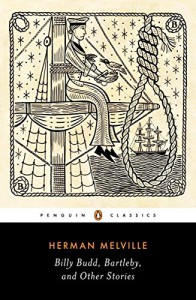Billy Budd, Bartleby, and Other Stories, by Herman Melville

Well that took me long enough! I've been desperate to read some horror, but these Melville stories have been hit and miss, his prose sometimes impenetrable. This is my second encounter with Melville (I read Moby Dick some years ago), and it's been a while. I was prompted to pick up this collection of his shorter works by recent references to both "Bartleby" and Billy Budd.
I began with "Bartleby, the Scrivener," which turned out to be my favorite. Melville is an excellent comic writer, and this portrait of a law office made me laugh out loud. Yet it's also incredibly poignant. The narrator is a lawyer who hires Bartleby as a scrivener (a copier); Bartleby joins three other employees, hilariously nicknamed Turkey, Nippers, and Ginger Nut. Bartleby goes about his copying, but when the lawyer asks him to read aloud his copy to proofread, he simply says he "prefers not to." From this point he "prefers" not to do all sorts of things, including leave when his boss attempts to fire him. The lawyer is non-confrontational and fancies himself a good man to the point where he actually changes the location of his office to avoid dealing with Bartleby (who is also found to be living there) further. Yet the problem of Bartleby persists.
Why does Bartleby "prefer not" to comply with requests made of him? Melville does not offer a black-and-white answer. The introduction likens Bartleby to a Wall Street occupier, someone who occupies spaces of capitalism without using them for that end, but the quote I found most insightful describes Bartleby as a man of preferences rather than assumptions. How much does our daily behavior and actions depend upon assumptions? As with other Melville works, a queer reading of the text is also possible: the relationship between the lawyer and Bartleby involves exchanges and behavior not dissimilar to those made in romantic partnerships.
The stories I liked next best were "The Encantadas, or Enchanted Isles" and "The Paradise of Bachelors and the Tartarus of Maids." The former is a series of sketches by a sailor who has been to the Galapagos Islands; some sketches are more engaging than others. The language in the first few is lovely as Melville describes the hostile, lonely island landscape. The latter is a pair of tales told by the same American narrator, first in London then New England--a lawyer's club and paper mill, respectively. These are apparently based on Melville's own travels. I preferred the second piece, which I read as feminist and potentially Marxist. There's some fantastic prose detailing the paper machine, the women, and their work.
There are five other stories, but the last I'll mention is the novella, Billy Budd, which Melville was working on at the time of his death. It's become key evidence for those who feel Melville may have been bisexual or simply held progressive views on gender and sexuality. Billy Budd is a "Handsome Sailor" who is conscripted to serve on a British naval ship. Everyone likes him, as he's pretty and good-natured. But one (also good looking) sailor envies his beauty and goodness, and it leads to tragedy. The most interesting thing about this tale for me was the fact that this is a story often told about women, to illustrate their vanity, jealousies, and pettiness or cattiness. In this context, in a time after two serious mutinies and during hostilities between Britain and France, such personal jealousy results in catastrophe.










